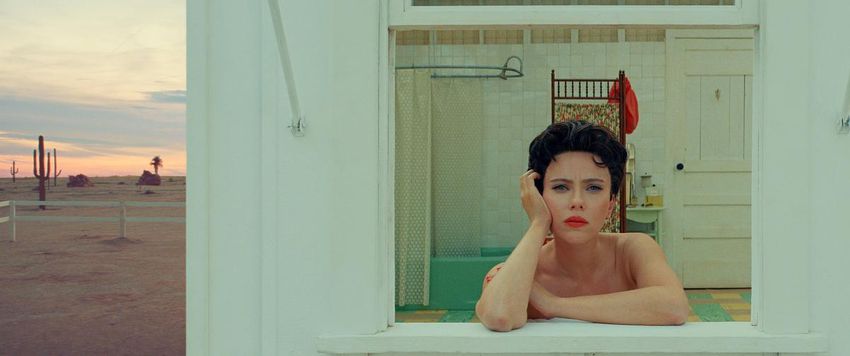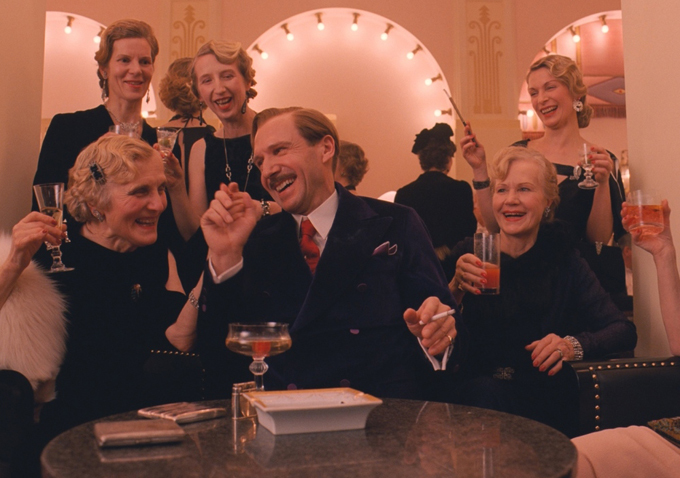
With Asteroid City, Wes Anderson has made yet another remarkably clever movie without an emotional core.
The main story takes place in the Cold War 1950s, in a Southwestern desert motel/cafe/gas station built around a roadside attraction meteor crater. The spot is so remote that it also hosts atomic bomb testing. The military-scientific complex has invited some gifted teenagers, accompanied by their parents, to receive science awards in this Atomic Age setting. After a space alien landing, the military quarantines everyone, and the characters all sit and wait, and then react. They are entirely deadpan, reflecting the absurdity of the setting, the story and the era.
Two of the parents are a noted ward photographer (Jason Schwartzman) who is recently widowed and a movie star (Scarlet Johansson). He is foundering, as he suppresses his grief. She is highly functional despite an extreme case of narcissism.
Asteroid City employs the device of a play within the movie. This gives Anderson three more roles to cast with movie stars – a playwright (Edward Norton), a narrator (Brian Cranston) and a director (Adrien Brody – very funny). It also provides even more emotional detachment – these characters aren’t supposed to be real people; these are actors playing those characters. But the main story is the one set in the desert.

Because of Anderson’s singular Kodachrome-in-the-desert color palette, Asteroid City looks like no other movie. And the so-called play really looks like a movie.
Asteroid City contains some very funny bits; among the best are:
- The brainiac teenagers, each with a photographic memory, play a name-memory game.
- An elementary school field trip bursts into an impromptu movie musical dance number.
- Little girls ceremoniously bury a Tupperware with their parent’s ashes between motel cabins.
- Jeff Goldblum is a perfect casting choice for a pivotal cameo.
- There’s a perky rendition of Freight Train with a dancing roadrunner in the closing credits.
- Johansson’s actress gets the funniest line, when she inquires about a photo.
Johansson’s contained performance as a ridiculously self-absorbed celebrity works well because Johansson doesn’t try to act ridiculous. Schwartzman is playing a Method-type actor playing an emotionally repressed neurotic, so maybe he is trying to be annoying…Along with Schwartzman, Johansson, Cranston, Norton, Brody and Goldblum, the cast includes Tom Hanks, Willem Dafoe, Margot Robbie, Matt Dillon, Jeffrey Wright, Liev Schreiber, Steve Carrell, Tilda Swinton, Hong Chau, Rupert Friend, Steven Park and Bob Balaban.

The acclaimed Wes Anderson is undeniably an auteur, whose films are highly imaginative. The finest film actors love working with him, and studios will finance his films. Yet, I have very strongly ambivalent feelings about his work. I’ve loved his Rushmore and Moonrise Kingdom and pretty much scorned his other movies. After The Grand Budapest Hotel, I refused to even see The French Dispatch, and I only saw Asteroid City because it was extremely convenient for me.
I have friends who enjoy Wes Anderson movies, and I can understand why. His films are breezy and a relief from all that is stupid in the culture. His backgrounds are filled with Easter Egg witticisms which are fun to scan for, and it’s fun to count off the movie stars (hey, that’s Matt Dillon!). He takes the viewer into worlds that only he can imagine.
But I’ve come to realize that Anderson often makes very clever movies whose characters don’t engage me. I really, really cared about Max Fischer in Rushmore and and Sam in Moonrise Kingdom. I never cared what happened to Steve Zissou or any of the fucking Tenenbaums. All wit and no heart doesn’t do it for me.
In Asteroid City, I really only cared about photojournalist’s son Woodrow (Jack Ryan) and the movie star’s daughter Dinah (Grace Edwards). That’s it.
Asteroid City may be a showpiece of deadpan wit and whimsy…but who cares?

